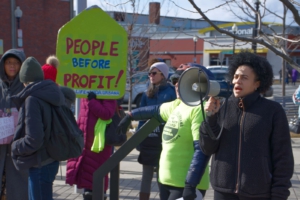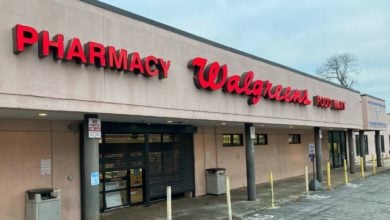On February 8, East Boston residents and their allies marched in freezing temperatures to oppose the Suffolk Downs development proposal to build 10,000 for-profit housing units — most of them luxury condos — in an area that is largely Latino and working class. The Suffolk Downs proposal, which would be the largest housing development in Boston’s modern history, would essentially create an entire new neighborhood for the white and wealthy exclusively — off limits to lifelong Eastie residents who cannot afford luxury condos at market rate. People United for East Boston Liberation and Organizing Coalition led over 50 protesters in a march from Maverick Square to Central Square Park. PUEBLO is an alliance composed of individual East Bostonians and local organizations including City Life/Vida Urbana, Cosecha, Massachusetts Coalition for Occupational Safety and Health, Boston Democratic Socialists of America, Boston Solidarity, Greenroots, Centro Cooperativo de Desarrollo y Solidaridad and Neighbors United for a Better East Boston.
Initiating the action, lead organizer Andres Del Castillo countered the lies put forth by the Boston Planning & Development Agency and their billionaire accomplices: “We know what these projects do to our communities,” Del Castillo explained. “We don’t have the MBAs, the Masters, we don’t work for the BPDA, we don’t have a billionaire in our pockets. But we have our lived experience and our knowledge. We know exactly what this is gonna do.”

As working class people in Boston can already attest, corporate development brings rising rent prices and gentrification to neighborhoods whose residents desperately need affordable housing. That is why PUEBLO demands that the developers of Suffolk Downs ensure that 50 percent of the 10,000 housing units are affordable. The definition of “affordable housing” set by the City of Boston is so broad that it can include an apartment that is only available to those making $100-$125K, spending 35 percent of their income on rent. In lieu of this, PUEBLO has a very explicit definition of affordability. Since the Area Median Income defines the midpoint of the income of families and individuals in a given area, PUEBLO demands that housing be affordable to those making 30 percent of the AMI. In Boston, this corresponds to roughly $35,000 a year for a family of four.
Others at the march connected the struggle for Suffolk Downs to the fight to lift the ban on rent control in Massachusetts. Liberation News spoke to Sonia, a 12-year resident of East Boston:
“I’m here marching because in reality, we need rent control. The reality is that the people who have more, want more. They don’t look at the hurt they cause towards the rest of us. So it’s for that reason that the Hispanic community that lives in East Boston has united with communities that let us know about our rights. And that hopefully the landlords won’t take advantage of us, of a humble people that come here to work, and on top of that, they want to raise the rent even though we are living in bad conditions. Apart from those conditions that they don’t want to fix, they want more and more money. If we don’t pay, then we end up on the streets, and that’s an injustice that God doesn’t like, and it’s because of this that I’m here supporting the Hispanic community.”
Rent control relates to the Suffolk Downs proposal because corporate and luxury development and rising rent prices work off each other in a vicious cycle. As wealthier white renters move into luxury housing, local landlords and slumlords see it as an opportunity to raise everyone’s rent. Lead PUEBLO organizer Gabriela describes the impact of gentrification on her community:
“We are seeing this economic boom, especially after the recession, trying to reclaim these cities, these urban [land]scapes that have been neglected historically, as a place for speculation and the maximization of profits…Versus in honoring the market that actually has the biggest needs around affordability… Personally, it affects me because I’m literally, through my eyes, I’m seeing people who look like me disappear from this community… I’m seeing other young people my age leave East Boston, being displaced out of East Boston, because they no longer can work more to support their parent’s financial burden of rent.”
A sign at the march that read “people before profit” was a necessary reminder of how the people of East Boston are fighting tooth and nail to assert that their right to live in their homes supplants the right of developers to profit off of the destruction of their communities.





